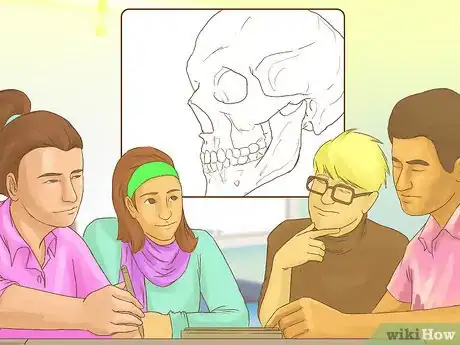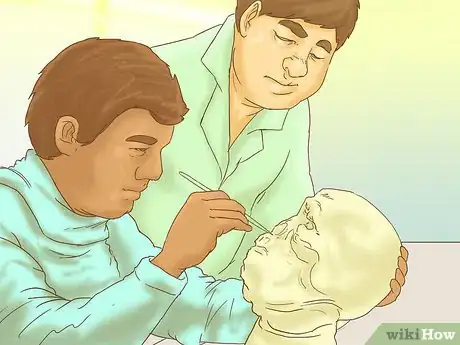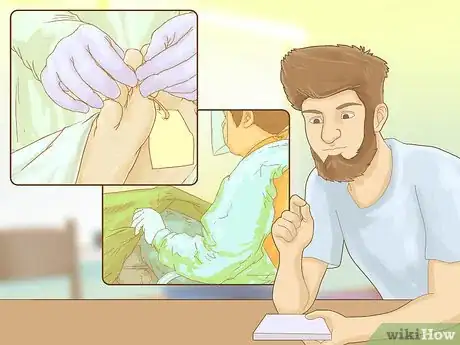This article was co-authored by wikiHow Staff. Our trained team of editors and researchers validate articles for accuracy and comprehensiveness. wikiHow's Content Management Team carefully monitors the work from our editorial staff to ensure that each article is backed by trusted research and meets our high quality standards.
This article has been viewed 57,043 times.
Learn more...
Morticians are always in demand, since there will always be a need for funerals. If you're interested in becoming a mortician, you need to work as an apprentice with a local funeral home first to gain the skills necessary for the career. Once you land an apprenticeship, make the most of the experience. An apprenticeship will help you figure out if you want to work as a mortician long term.
Steps
Beginning Your Path in High School
-
1Learn about the career. If you become a mortician's assistant, you will eventually go on to become a mortician. You'll want to spend some time learning about the career and what it entails. A mortician's job is difficult emotionally draining, but can also be incredibly rewarding as well. Spend some time familiarizing yourself with the duties of a mortician.[1]
- As a mortician, it's your job to prepare bodies for burial. You will also have to worked with bereaved families, making sure all their wishes are met. You may occasionally have to talk to people who are near death about arrangements for their own bodies after death.
- In addition to working with bodies, there is a lot of practical work that goes into becoming a mortician. You must help families sort out financial obligations regarding funerals and may have to do basic clerical and administrative work at your funeral home.
- Working with people is an important aspect of being a funeral director. You may have to network with counselors and psychiatric professionals so you can refer clients to needed resources. As you'll be working with emotional people, the job can be draining. Many morticians, however, find it incredibly rewarding to see people through the grieving process.
-
2Take the right classes in high school. If you want to be a mortician, start early on. Take the right curriculum in school to help you gain necessary skills. Your high school course load can help you get into the proper higher education program after graduation.[2]
- As you'll be working with bodies, it's a good idea to stock up on science courses. Take classes in anatomy and biology.
- You should also look into courses in business, finance, and economics as much of your job revolves around managing finances.
- As your job requires a lot of time working with people, consider taking a course or two in psychology. This can help you learn how to read people better and help bereaved families manage emotions.
Advertisement -
3Look for part time jobs working with people. It's a good idea to start gaining experience as early as possible. As a mortician, you'll need a wide range of skills to be successful. One important aspect of the job is working with people. Look for jobs that build your people skills.[3]
- Seek out work that allows you to work with others. Working in fields like retail and customer service part time during high school can help you build the skill set necessary to succeed as a mortician.
- You may be able to get work part time at a local funeral home. You can be a receptionist or something else that does not require a specific degree. If you let the owners know you're interested in becoming a mortician, they may be more likely to hire you for desk work.
-
4Find a job at a hospital. Even without a high school degree, you may be able to find some work at a hospital. As a lot of medical knowledge is necessary to become a mortician, working or volunteering at a local hospital can bolster your resume.
- Some hospitals may have volunteer programs for young people interested in careers related to medicine.
- You can also see if you can do administrative work, like working or volunteering as a secretary.
-
5Make sure you're prepared for the emotional toll of the job. Becoming a mortician means working with death every day. If you want to pursue your apprenticeship, and eventually become a mortician, spend a long time thinking about the emotional toll the job will have. You will be dealing with bereaved family members and also have to handle dead bodies on a daily basis. Make sure you're up for the difficulties of the job.[4]
- As a mortician, your job will be demanding. There is a lot of physical labor involved in preparing a body for a funeral. Think long and hard about whether you can handle looking at bodies day in and day out.
- Think about dealing with families. Ask yourself honestly whether you're a people person. As a mortician, you need to be able to talk to people during times of incredible grief, so make sure you're up to the task of dealing with others. You need to be an empathetic person who is easy to talk to if you want to be a mortician.
- While the job can be difficult, many morticians find their line of work to be incredibly rewarding as well. Despite some of the difficulties of the job, if you're interested in helping others cope with death, a mortician may be a good line of work for you.
-
6Consider your social life. Many people are uncomfortable with death, and may feel nervous around a mortician. Be prepared for intimidated reactions when you let people know about your line of work. Make sure you're ready for the toll your job will take on your social life.[5]
- When it comes to romance, many morticians find it's easier to date people in a medical field. However, as medical workers are notoriously busy, this can make dating difficult.
- You will also have an unpredictable schedule as a mortician. You may not know when you'll be free, as you may have to be on call for grieving families.
Gaining Education and Training
-
1Consider what kind of higher education you want. You need at least some higher education to become a mortician. You need at least an associate's degree in mortuary sciences to become a mortician, but you can also find mortuary sciences programs in four year colleges. You can attend a regular college, but you can also get a degree from a specialized mortuary school.[6]
- Think about how long you want to spend getting your degree. You can get a degree in two years and move on to an apprenticeship program then. If you're looking for a quick path to becoming a mortician, this may be the right choice. You may also want to look into a specialized mortuary school, as having a specific education may give you a better chance of landing an apprenticeship.
- However, how certain are you in your career path? You can also attend a four year college, where you can study subjects other than mortuary sciences. This way, if you decide you'd rather do something else as a career, you have the option to change majors or explore career paths. A traditional four year school may be the right choice for you if you have any misgivings about becoming a mortician.
-
2Gather the materials necessary to apply to a higher education program. Once you've decided on the right track for yourself, start applying for your chosen program. Programs will require different materials for the application, so read application requirements carefully to make sure you get into a quality program.
- You usually need a copy of your high school transcripts, which you can get from your counselor. You also may need test scores, such as SAT or ACT scores.
- Letters of recommendation may also be important. Talk to old high school teachers or anyone you worked with in the past, especially jobs related to mortuary studies. If you worked in a funeral home, for example, you may want to ask your boss there for a letter of recommendation.
-
3Complete the application process. After gathering materials, you can complete the application process for the program you chose. You'll usually have to fill out a basic application, that includes things like your name, address, and so on. You'll also want to make sure you follow all protocol for submitting your application.
- Some programs may require you to write an essay overviewing what you hope to get out of your education. If you need to write an essay for your chosen program, spend a long time working on your essay and make sure it's free of spelling and grammatical errors.
- Read submission instructions carefully. Make sure you know where to mail your application, or how to submit electronically.
-
4Complete your chosen higher education program. Once you've been accepted to a program, you can begin your studies. Make sure you work hard. If you stand out in a program, it'll be easier to find an apprenticeship down the road. Work hard to earn high marks in all your courses.
- You will study a lot of anatomy and biology during your program. You'll need to have a working knowledge of the human body in order to be a successful mortician. By the time you complete your program, you should have a sophisticated understanding of how the body works.
- You'll also study some practical aspects of being a mortician. You'll study the science of embalming and cremation, as well as cosmetology and restorative art so you know how to prepare bodies for family members. You'll also have to study a bit about funeral law so you understand the legality of the funeral and burial industry.
-
5Look for internships during your time at school. An internship can always help set your resume apart when applying for an apprenticeship program. Talk to professors in your program, as well as career counselors if they're available. Ask them about internship opportunities and have them direct you to relevant job boards and listings. An internship working at hospital or funeral can be a great resume builder as you apply to apprenticeship programs.
-
6Ask your school counselor about apprenticeship programs. As you near the end of your studies, you'll want to start seriously looking for apprenticeship programs. Ask your school counselor about where to apply. If you're going to a mortuary school specifically, there may be a placement program for apprenticeship programs available to you. You can also call local funeral homes and ask about programs.[7]
- School counselors should be able to direct you to programs and give you guidance on how to apply. Start applying as you near the end of your program. Make a list of possible programs, and jot down the application requirements. Spend a little time each week polishing off applications. You should apply to several programs at a variety of local funeral homes.
- Find an apprenticeship that works with your needs. You'll want to find an apprenticeship in an area where you're comfortable living. You'll also want to see what kind of funding or payment is offered during your time as an apprentice.
Finding an Apprenticeship
-
1Write a solid resume. You will probably need to write a resume to apply for an apprenticeship program. Start working on your resume as you near the end of your formal education. This will be an important tool as you hunt for the right apprenticeship.
- Choose a legible, professional font, like Arial or Times New Roman. Organize your resume in a logical fashion, putting your most recent and relevant experience first. Mark section headings with all capital letters, and avoid unprofessional bullet points or other decorations.
- List all experience you have that's related to funeral services. If you took an internship in a hospital or funeral home, include this. You should also include any experience you have working with people, such as customer service work.
- Be specific. For example, say you're writing about your experience working at a funeral home. Do not write, "Talked to families on the phone to schedule meetings with the funeral director." Instead, write something like, "Coordinated between bereaved families and the funeral director in regards to scheduling and funeral arraignments, taking between 10 and 20 calls each week."
-
2Contact past co-workers, supervisors, and professors. As you're hunting for the right apprenticeship, dip into your professional network. Past professors, co-workers, and supervisors may know of a funeral home seeking apprentices. They may be able to put a word in for you if they can speak to your skill set. Networking is one of the best means to find professional work.
-
3Practice good interview skills. As you begin to get interviewed for apprenticeships, make sure you practice good interview skills. Behaving in a professional and impressive manner during an interview can help you land the job.[8]
- Use body language to convey confidence. Sit up straight, make eye contact, and give a firm handshake. Nod as the interviewer is talking to show you are listening.
- Make sure you use appropriate language. Avoid slang words and profanity, and use words related to the funeral industry. This will show you have a working knowledge of the mortician profession.
- Always ask questions. You do not want to leave an interview without asking questions to show you're genuinely interested. Ask an open ended question, like, "What is the culture of this funeral home like?" and "What does an average day of work look like here?"
-
4Make the most of your apprenticeship. When you do land an apprenticeship, make the most of your time. Your apprenticeship is the time where you'll hone your skills as a mortician and can determine the course of your future in this career path.[9]
- Your apprenticeship will last between one or two years, depending on your state's regulations. You'll work one-on-one with a funeral director, learning the trade. Do not hesitate to ask your director for advice and guidance during this time.
- You may have to pass a certification exam in your state if you want to go on to become a professional mortician. Make sure you pay close attention to what you're being taught, as much of this information will show up on your eventual exam. Bring a notebook to your funeral home and take notes. You should also see if there are any supplemental reading materials that may be helpful to a budding mortician.
-
5Think about your future career. As you work through your apprenticeship, think about your upcoming career. Being a mortician is a difficult but rewarding job. You should spend your internship seriously considering whether or not the job is right for you.[10]
- Think about the longterm salary. Morticians do not usually make a lot from their trade, although you can live comfortably. The average salary is around $46,000 per year. Some morticians may make as much as $80,000, but this is rare. One of the perks, however, is that there's a healthy job market for morticians. It may be easier to get a job than it would in other fields.
- Your schedule as an apprentice will likely be similar to your eventual schedule as a mortician. Think about whether you can handle the hours, which may erratic. You should also take stock of your emotional wellbeing. Dealing with the bereaved can be difficult and at times depressing work. However, you may also find the process of helping people come to terms with loss to be enlightening and personally rewarding.
References
- ↑ http://www.howtobecome.com/how-to-become-a-mortician
- ↑ http://learn.org/articles/How_Do_I_Become_a_Mortician.html
- ↑ http://www.howtobecome.com/how-to-become-a-mortician
- ↑ http://www.businessinsider.com/a-mortician-reveals-what-its-like-to-work-at-the-morgue-2013-2
- ↑ http://www.businessinsider.com/a-mortician-reveals-what-its-like-to-work-at-the-morgue-2013-2
- ↑ http://www.howtobecome.com/how-to-become-a-mortician
- ↑ http://www.morticianschool.net/become/
- ↑ http://www.monster.com/career-advice/article/boost-your-interview-iq
- ↑ http://www.howtobecome.com/how-to-become-a-mortician


















-Step-9.webp)





















-Step-9.webp)




































